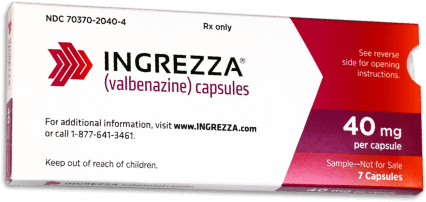INBRACE® Support Program for INGREZZA
Many paths, one goal: Access for every patient prescribed INGREZZA

With many paths to INGREZZA® (valbenazine) capsules, the INBRACE Support Program is committed to the goal of helping all patients get access to the medication they need
Call 1-84-INGREZZA (1-844-647-3992), 8 am to 8 pm ET, Monday through Friday, to learn more.
$10 or less out-of-pocket is what most patients pay for INGREZZA1
Financial assistance options are available to help your patients start and stay on treatment
Now it’s easier than ever for your patients to access INGREZZA
INGREZZA coverage is approved for more than 8 of 10 patients nationwide1
$10 or less out-of-pocket is what most patients pay for INGREZZA1
Financial assistance options are available to help your patients start and stay on treatment
Now it’s easier than ever for your patients to access INGREZZA
INGREZZA coverage is approved for more than 8 of 10 patients nationwide1
Dedicated, field-based support to provide personalized access solutions
Our Regional Patient Access Managers (RPAMs) are available to help you and your office navigate access
Start your patients on INGREZZA right away

FREE TRIAL OFFER
Request a free one-month supply of INGREZZA for new patients
REQUEST TRIALThe free trial is not contingent on a purchase of any kind. Product dispensed under this free trial program may not be submitted for reimbursement to any third-party payer. We reserve the right to modify or cancel the program at any time. Additional terms and conditions apply.
INGREZZA SAVINGS PROGRAM*
Eligible patients may pay as little as a $0 copay on their INGREZZA prescription
*This offer is valid only for patients with commercial (nongovernment-funded) insurance. Additional terms and conditions apply.
DOWNLOADCOPAY CARD
INGREZZA PATIENT ASSISTANCE PROGRAM†
Eligible patients with no insurance -or- no prescription coverage for INGREZZA may be able to receive their prescription at no cost
†Additional terms and conditions apply.
APPLY FORASSISTANCE
LOOKING FOR MORE ACCESS RESOURCES?
Download access-related forms and templates to help you and your practice
DOWNLOADRESOURCES
REFERENCE:
- Measured by NDC; data on file as of Q3 2023. Neurocrine Biosciences, Inc.
